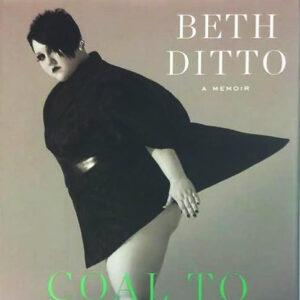calsfoundation@cals.org
Coal to Diamonds
Coal to Diamonds: A Memoir (2012) was written by Beth Ditto, singer and songwriter for the band Gossip, and co-written by queer popular fiction writer Michelle Tea. In the memoir, Ditto writes about growing up poor in Judsonia (White County) with five siblings, as well as the rampant sexual abuse her female family members experienced. She also discusses coming into her own as a singer, femme-identified lesbian, and feminist.
As Ditto recounts, her youth was often turbulent. She frequently lived with her aunt Jannie, along with her aunt’s two children and three cousins placed there by social services. Despite the fact that she was often left with the responsibility of cooking, cleaning, and looking after the children, Ditto describes the home as a “refuge” where she was able to escape a violent stepfather. Ditto’s mother, Velmyra, had married Homer Ditto when she was fifteen years old and had three children with him. Beth Ditto, born Mary Beth Patterson, was Velmyra’s fourth child but with a different man who was not around for long. She was later given the last name of Homer Ditto, who helped raise her. Velmyra partied often and had many “whirlwind romances” that caused Ditto to live in different places, including Homer Ditto’s house in Georgetown (White County). Ditto moved back in with her aunt to take care of her when she became ill, and Jannie eventually died of cancer. The family later learned that Jannie’s son and Ditto’s cousin, Dean, had been raping one of the children living in Jannie’s household. Dean was ultimately arrested for the crime. Ditto also describes being sexually abused throughout her youth by her uncle Lee Roy, who also abused her sister, Akasha.
In high school, Ditto got into the grunge music scene and later discovered the Riot Grrrl scene, a second-wave feminist movement of the 1990s that addressed the sexism and male dominance within punk music and culture at large. As a large girl, Ditto began making clothes, as she could not fit into most clothes, was unable to afford new ones, and believed there were no stylish clothes in Arkansas. Also during her high school years, Ditto met Kathy Mendonca and Nathan Howdeshell from Searcy (White County), who later became part of the band Gossip.
After graduating from high school, Ditto moved to Olympia, Washington, where Mendonca had moved to attend Evergreen State College and where Gossip formed. The band’s first major show was at the Fillmore in San Francisco, California, during their tour with Sleater-Kinney in 1999. During her time in Olympia, Ditto worked various low-level service jobs that she had to quit whenever the band left to tour and record. Though Ditto learned to embrace her big and loud voice, the band’s relocation from Olympia to Portland, Oregon, was difficult, and Ditto fell into a deep depression while also experiencing symptoms of sarcoidosis, a rare disease. Due to the disease, Ditto lost a portion of her hearing and vision and also had throat problems, but her symptoms eventually improved. Mendonca left Gossip in 2005 and was replaced by Hannah Blilie. The following year, the band released Standing in the Way of Control, which was recorded at the iconic Bear Creek Studio outside of Seattle, Washington, where they worked with Guy Picciotto from the band Fugazi. Ditto calls 2009 “a year of firsts”: Gossip had its first platinum record (Music for Men), she was able to buy her mother a house, she started her own fashion line, and she first modeled on a runway, for Jean-Paul Gaultier.
Throughout her memoir, Ditto brings attention to the racism and homophobia she witnessed in both Arkansas and Washington, as well as the sexism and sizeism she has experienced as a large woman, stating that she has had difficulty being taken seriously as a singer even within the Riot Grrrl scene. Ditto ends her work encouraging readers to reject the negative ideas others might have about them, as well as the self-deprecating voices inside their own minds that might prevent them from achieving their destiny.
The memoir caused some controversy pertaining to the squirrel-hunting story that starts off the book—her cousin Dean shooting, cleaning, and eating squirrel after finding no food in Aunt Jannie’s house. Although some media outlets and animal rights activists became preoccupied with that section, Coal to Diamonds: A Memoir was received positively and reviewed by various popular news outlets in the United States and Europe, including The Guardian, Spin, Metro, Bust, and NME. In 2012, The Guardian noted the lack of discussion about Ditto’s music career and greater focus on her personal story, yet praised the memoir for its raw sincerity. NME gave the book four stars out of five.
For additional information:
Ditto, Beth, with Michelle Tea. Coal to Diamonds. New York: Spiegel & Grau, 2012.
Empire, Kitty. “Coal to Diamonds: A Memoir by Beth Ditto—Review.” The Guardian, October 20, 2012. https://www.theguardian.com/books/2012/oct/21/coal-diamond-beth-ditto-review (accessed May 24, 2017).
Marchese, David. “Beth Ditto Bares All in Her Memoir ‘Coal to Diamonds.’” SPIN, October 11, 2012. http://www.spin.com/2012/10/beth-ditto-book-coal-to-diamonds/ (accessed May 24, 2017).
Perry, Kevin E. G. “Book Review: Beth Ditto—‘Coal To Diamonds.’” NME, October 26, 2012. https://www.nme.com/reviews/reviews-beth-ditto-13817-320769 (accessed March 2, 2020).
Amy Ulmer
Arkansas State University
 Divergent Prosperity and the Arc of Reform, 1968–2022
Divergent Prosperity and the Arc of Reform, 1968–2022 Literature and Authors
Literature and Authors Coal to Diamonds
Coal to Diamonds 




Comments
No comments on this entry yet.